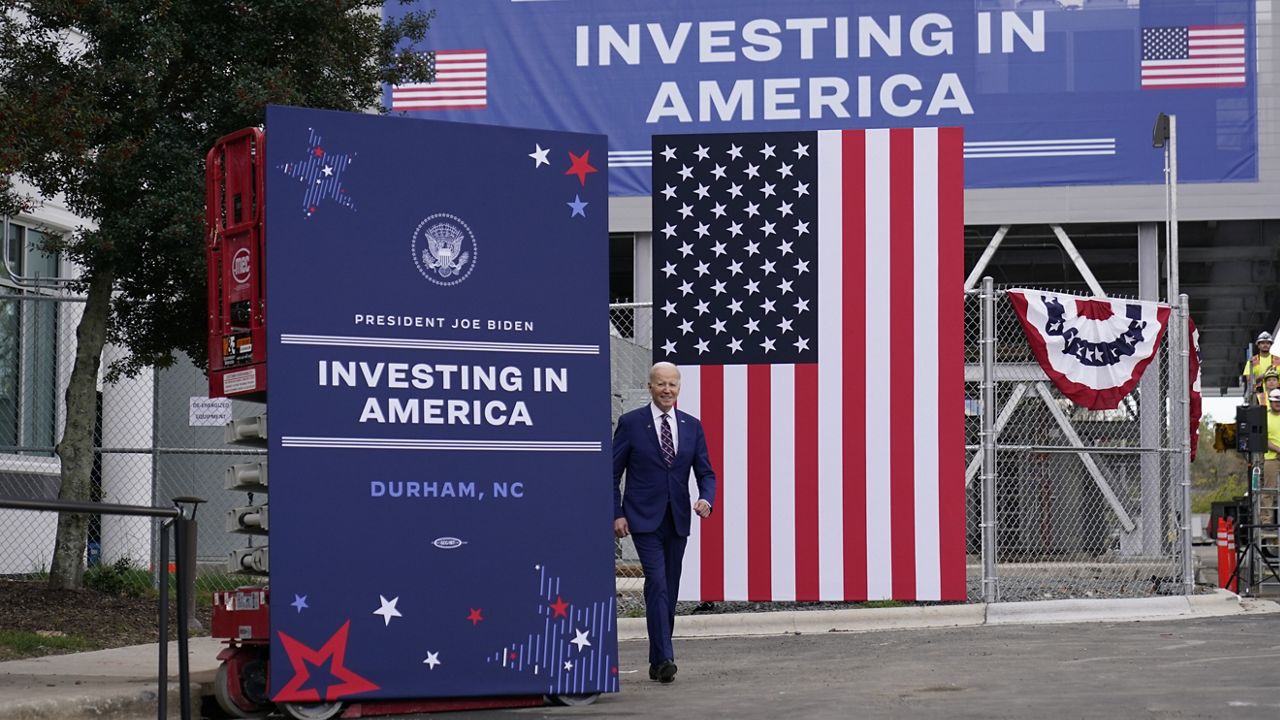President Joe Biden on Monday announced a more than $42 billion investment to expand broadband to every American, which kicked off another multi-state travel blitz where officials will highlight his major economic legislative accomplishments.
A White House official said that the funding will be distributed to all 50 states, D.C. and territories "to connect everyone in America to affordable, high-speed internet."
“We all know how difficult life is when electricity goes down after a storm or for other reasons,” White House chief of staff Jeff Zients said on a call previewing the announcement last week. “For millions of Americans in rural communities in particular, the internet is down a lot. Sometimes there’s not even any access.”
The White House compared the effort to one undertaken nearly a century ago to bring electricity to households across the country.
"Just like Franklin Delano Roosevelt delivered electricity to every home in America through his Rural Electrification Act, the announcement is part of President Biden’s broader effort to deliver investments, jobs, and opportunities directly to working and middle-class families across the country," the official said.
The amount each state, territory and Washington, D.C., will receive from the $42.5 billion program depends primarily on the number of unserved locations in each jurisdiction or those locations that lack access to internet speeds of at least 25 megabits per second download and 3 Mbps upload. Download speeds involve retrieving information from the internet, including streaming movies and TV. Upload speeds determine how fast information travels from a computer to the internet, like sending emails or publishing photos online.
In an interview with Spectrum News last week, Bharat Ramamurti, the Deputy Director of the National Economic Council, called Monday's announcement an "incredible amount of funding."
“We're ready to announce that there's going to be an incredible amount of funding, more than $40 billion worth of funding, spread out to states all across the country to make sure that every single household in those states is connected to high-speed internet access," Ramamurti said.
Ramamurti said the funding announcement follows the completion of a broadband map showing where internet available in the U.S. and where it is lacking. The National Telecommunications and Information Administration found about one in five U.S. households are not using the internet at home.
“That means that they're less able to stay connected, less able to participate in the modern economy, less able to do telehealth, which is really important for especially older Americans,” Ramamurti said.
Over the next three weeks, top administration officials will hit more than 20 states, to promote legislative accomplishments, including the $1.2 trillion Bipartisan Infrastructure Law, the climate change and tax reform bill known as the Inflation Reduction Act and the CHIPS and Science Act, a bill aimed at boosting domestic semiconductor production.
Since the enactment of those three bills, Ramamurti said the private sector has invested nearly half a trillion dollars in manufacturing, particularly in clean energy and semiconductor manufacturing.
“Part of this tour is to show the concrete benefits that these laws and this investment is bringing into communities all across the country,” Ramamurti said, adding “whether you voted for the president or not, or whether your representative voted for the infrastructure bill or not, your city, your community is benefiting from the fact that those laws were put in place.”
Earlier this month, the White House launched a website showing projects in the works around the country funded by Biden’s $1.2 trillion Bipartisan Infrastructure Law. Since its passage in Nov. 2021, more than $220 billion from the bill has gone toward improving roads, bridges, water infrastructure and other areas, according to the White House.
The administration first sent officials out on the road to highlight the president’s work over his first two years in office in March. The second cross-country effort will start with Biden’s announcement Monday and continue through mid-July, coinciding with Congress’ July recess when lawmakers are out of town.
As part of the tour, the White House announced seven members of Biden’s cabinet will make stops in the northeast, Midwest, South and Hawaii to tout the administration’s efforts on high-speed internet, domestic manufacturing, job creation, wildfire resilience, clean energy and lowering healthcare costs.
With Biden wrapping up a multiple-day trip to California to fundraise for his reelection bid and the 2024 campaign in full swing, officials are expected to contrast Biden’s investments with GOP efforts to repeal particular provisions of the Inflation Reduction Act.
The Associated Press contributed to this report.



